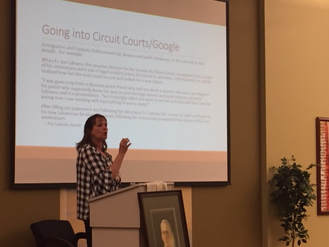
Attorney Barbara Graham returned to the Provincialate Offices on May 29 for an update on what is happening with immigration policy in the United States. Speaking at last June’s Provincial Assembly, she had talked about the “impossible system” of immigration law and how President Trump’s then-brand-new executive orders would only make things worse. She also humorously demonstrated the huge waste of money that "building a wall" would be.
This time out, the audience consisted of a dozen SCJs and about 20 others, mainly from parishes from Franklin to West Bend. What they got was a comprehensive explanation of what’s happened since we last heard her. One person described the experience as “taking a drink from a firehose!” From her perspective as Director of Legal Services for Catholic Charities Milwaukee, Barbara explained the many ways the Administration is radically changing our immigration system “though the back door.” She explained how – despite Congress’ inability to pass immigration reform – the statutes currently on the books must be interpreted and fleshed out by the Executive branch, and how the way President Trump and his subordinates have done so in ways that have further “decimated” the few rights granted to asylees, especially those who are victims of domestic violence.
This time out, the audience consisted of a dozen SCJs and about 20 others, mainly from parishes from Franklin to West Bend. What they got was a comprehensive explanation of what’s happened since we last heard her. One person described the experience as “taking a drink from a firehose!” From her perspective as Director of Legal Services for Catholic Charities Milwaukee, Barbara explained the many ways the Administration is radically changing our immigration system “though the back door.” She explained how – despite Congress’ inability to pass immigration reform – the statutes currently on the books must be interpreted and fleshed out by the Executive branch, and how the way President Trump and his subordinates have done so in ways that have further “decimated” the few rights granted to asylees, especially those who are victims of domestic violence.
From routinely denying stays of removal, trying to reopen 350,000 cases that were administratively closed years ago (further swelling the backlog of pending removal cases which stands at almost 700,000), to denying full hearings to asylees and suggesting that 3 year olds can represent themselves in court, the Administration has completely overwhelmed the system and effectively deprived refugees and the undocumented of any rights. Barbara explained that while 90% of those represented by nonprofit lawyers win their cases, 90% of those who are unrepresented lose (private lawyers win 74% of their cases), and the great majority are now unrepresented. Even for those who are lucky enough to find representation, the legal process is getting more complicated, slower, and more expensive. (Catholic Charities does have a list of approved attorneys on their website, and Barbara noted that the better ones are often not the most expensive.)
Many in the immigrant community now live in fear of being picked up even going to and from church or the hospital, and are too scared to pay parking tickets, report crimes, or call about domestic violence. Even ICE (the enforcement arm of the immigration system) is overwhelmed by the change in how they are expected to carry out their jobs, no longer focusing only serious criminals but anyone who is not a legal resident, no matter how long they’ve been here or how law-abiding they are. ICE is now often doing Google searches and scanning through public databases of all kinds in order to find people to be detained and put into removal proceedings. Even those who’ve been reporting in routinely for years, like Ragbir, whose story she shared, are being detained without warning and separated from their families.
Add to this the termination of DACA, the ending of Temporary Protected Status for people from Syria, Central America, and several other countries still rife with violence and chaos, and attempts to punish and sue “Sanctuary Cities,” and you have a true upheaval in this country around this issue, one which Grant Silva last year called “the civil rights issue of our time.” Many in the Church have taken a moral stance by publicly opposing the administration’s moves, condemning the President’s attempts to appeal to fear and de-humanize migrants and refugees (and most recently to immediately separate all children from their undocumented parents at the border). Our own U.S. Bishops have spoken out strongly and clearly on the issue.
Barbara concluded by talking about what we can do. First, she took a page from Fr. Dehon – promote Catholic Social Teaching, from the pulpit and through parish educational programs. She talked of her experience speaking at many white, middle and upper-class parishes about the immigration and getting a good response. One audience member, however, spoke of the many Catholics he has known whose minds seem to be closed. We have to find ways of reaching people and fostering respectful dialogue.
Obviously legal assistance is also key. The U.S. Province will be partnering with the School Sisters of St. Francis in Milwaukee to raise funds to pay DACA renewal fees for students who are eligible; people were encouraged to find other creative ways to raise funds to assist those in need. Those who wish to get involved personally can always find ways to help through local immigrant advocacy groups and their local Catholic Charities.
Beyond the limited power we have as citizens to change laws and influence politicians, some also choose to resist and protest. Barbara spent some time talking about the rise of the New Sanctuary Movement, which echoes the efforts of churches and people of faith in the 80s to harbor refugees and the undocumented, sometimes secretly, sometimes publicly. The motivation can be simply to keep someone alive, or to publicly challenge unjust policies, and the potential risk for prosecution can range from almost nil to virtual certainty depending on what you do, but simply giving moral or material support to others who are providing sanctuary is not illegal.
Barbara’s presentation came in the middle of two days of meetings for the North American Migration Commission, which sponsored the program. At their meeting the next morning, the members of the committee were unanimous in their appreciation to Barbara for presenting such a complex topic in such a dynamic and interesting way, but agreed that our next step as a Province must be to grapple with the moral dimensions of this crisis and consider all the ways we ought to respond.
Many in the immigrant community now live in fear of being picked up even going to and from church or the hospital, and are too scared to pay parking tickets, report crimes, or call about domestic violence. Even ICE (the enforcement arm of the immigration system) is overwhelmed by the change in how they are expected to carry out their jobs, no longer focusing only serious criminals but anyone who is not a legal resident, no matter how long they’ve been here or how law-abiding they are. ICE is now often doing Google searches and scanning through public databases of all kinds in order to find people to be detained and put into removal proceedings. Even those who’ve been reporting in routinely for years, like Ragbir, whose story she shared, are being detained without warning and separated from their families.
Add to this the termination of DACA, the ending of Temporary Protected Status for people from Syria, Central America, and several other countries still rife with violence and chaos, and attempts to punish and sue “Sanctuary Cities,” and you have a true upheaval in this country around this issue, one which Grant Silva last year called “the civil rights issue of our time.” Many in the Church have taken a moral stance by publicly opposing the administration’s moves, condemning the President’s attempts to appeal to fear and de-humanize migrants and refugees (and most recently to immediately separate all children from their undocumented parents at the border). Our own U.S. Bishops have spoken out strongly and clearly on the issue.
Barbara concluded by talking about what we can do. First, she took a page from Fr. Dehon – promote Catholic Social Teaching, from the pulpit and through parish educational programs. She talked of her experience speaking at many white, middle and upper-class parishes about the immigration and getting a good response. One audience member, however, spoke of the many Catholics he has known whose minds seem to be closed. We have to find ways of reaching people and fostering respectful dialogue.
Obviously legal assistance is also key. The U.S. Province will be partnering with the School Sisters of St. Francis in Milwaukee to raise funds to pay DACA renewal fees for students who are eligible; people were encouraged to find other creative ways to raise funds to assist those in need. Those who wish to get involved personally can always find ways to help through local immigrant advocacy groups and their local Catholic Charities.
Beyond the limited power we have as citizens to change laws and influence politicians, some also choose to resist and protest. Barbara spent some time talking about the rise of the New Sanctuary Movement, which echoes the efforts of churches and people of faith in the 80s to harbor refugees and the undocumented, sometimes secretly, sometimes publicly. The motivation can be simply to keep someone alive, or to publicly challenge unjust policies, and the potential risk for prosecution can range from almost nil to virtual certainty depending on what you do, but simply giving moral or material support to others who are providing sanctuary is not illegal.
Barbara’s presentation came in the middle of two days of meetings for the North American Migration Commission, which sponsored the program. At their meeting the next morning, the members of the committee were unanimous in their appreciation to Barbara for presenting such a complex topic in such a dynamic and interesting way, but agreed that our next step as a Province must be to grapple with the moral dimensions of this crisis and consider all the ways we ought to respond.
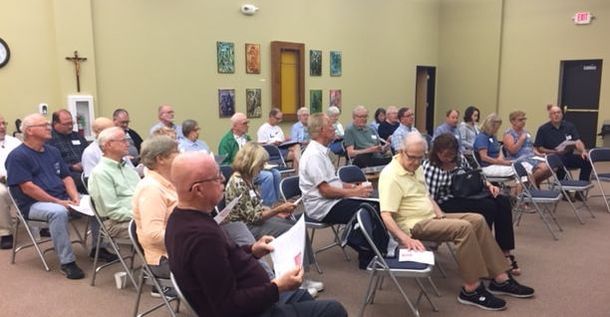
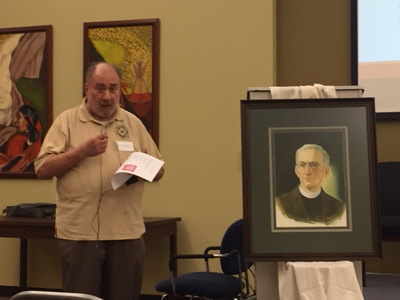
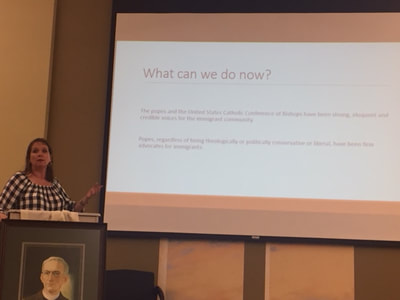
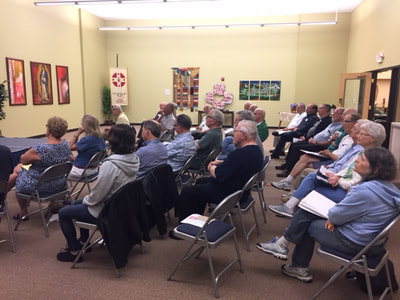
 RSS Feed
RSS Feed